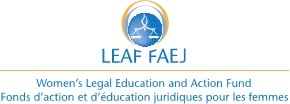On Thursday, April 20th, 2017, the Ontario Court of Appeal granted Dr. Lynn Gehl’s appeal in her challenge to ongoing sex discrimination in the Indian Act. The Women’s Legal Education and Action Fund (LEAF) welcomes the decision of the Court that Dr. Gehl is entitled to registration under the Act. Read the full decision here.
“LEAF is thrilled that Dr. Gehl’s long walk to justice has reached this momentous conclusion, and relieved that the Court has taken the unusual step of substituting its decision for the administrative decision maker and granted Dr. Gehl status. The Court stated that returning it to the administrative decision maker would be ‘pointless’ because registration would be the only possible outcome,” notes LEAF Legal Director Dr. Kim Stanton.
Dr. Lynn Gehl is an Algonquin-Anishinaabe woman with more than five continuous generations of Indigenous ancestry. She challenged the Indian Act rules about who is entitled to register as an “Indian”, arguing that the rules discriminate on the basis of marital/family status and/or sex.
Dr. Gehl sought registration as an “Indian” in 1994, under the registration system in the Indian Act, colloquially referred to as “Indian status”. Aboriginal Affairs and Northern Development Canada (AANDC, now Indigenous and Northern Affairs Canada) denied her registration application. The AANDC Registrar determined that Dr. Gehl did not qualify for Indian status because her grandmother did not identify Dr. Gehl’s grandfather. Pursuant to AANDC’s Proof of Paternity Policy, if the father is not listed on the birth certificate, he is assumed to be non-Indigenous.
In December, 2016, LEAF intervened before the Ontario Court of Appeal to argue that the registration provisions of the Indian Act, as they are implemented by the Proof of Paternity Policy, create a distinction on the basis of sex and marital status that constitutes discrimination. Further, LEAF asserted that the parent who will be disadvantaged by this provision of the Indian Act and the associated Proof of Paternity Policy will inevitably be the mother, since it is fathers rather than mothers who are unstated on birth certificates. To see LEAF’s written argument in Gehl, see here.
In line with LEAF’s arguments at the appeal, Justice Sharpe states: “I agree with the Attorney General that the determination of entitlement to registration on the basis of the entitlement of both parents is, on its face, a gender-neutral rule. However, I also agree with Dr. Gehl’s submission that the Registrar was required to guard against an exercise of discretion that results in substantive inequality.” He further finds that the Proof of Paternity Policy: “perpetuates the long history of disadvantage suffered by Indigenous women. As Parliament itself recognized in 1985, the historic practice of stripping and denying Indigenous women of status represented a significant disadvantage that was inconsistent with the Charter’s promise of equality.”
LEAF congratulates Dr. Gehl and her counsel, and calls upon the government, in this era of reconciliation between Indigenous and non-Indigenous peoples, to eliminate all remaining forms of ongoing discrimination against Indigenous women and their children in the Indian Act. (See LEAF’s brief on the latest insufficient legislative attempt to do so here.)
LEAF is proud to have been represented in this appeal by Renée Pelletier and Krista Nerland of Olthuis, Kleer, Townshend LLP. We are very grateful for their pro bono representation.
About Women’s Legal Education and Action Fund (LEAF) Since April 17, 1985, when equality rights were enshrined in sections 15 and 28 of the Charter of Rights and Freedoms, LEAF has worked toward equality for women and girls. LEAF intervenes in key cases to ensure that when courts interpret equality rights, there will be a systemic improvement in women’s lives. For more information about LEAF, visit www.leaf.ca.
